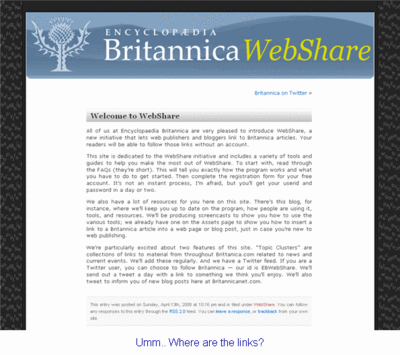Encyclopaedia Britannica Extends a Toe Outside Walled Garden
Via TechCrunch comes word that Encyclopaedia Britannica has launched a new program, Britannica Webshare, in which it plans to make its content available for links from bloggers and other authors.
Under the program, bloggers and other web writers will be able to link to Britannica articles, with their readers able to access the articles without requiring a subscription.
Britannica has also announced a Twitter feed available here. A Twitter feed for a reference source may be tough to make compelling. Hopefully, they will target the content based upon current events and not simply surface the "tidbit of the day". In conjunction with this, they've also launched a handful of Britannica widgets covering select topics such as baseball, communism and nobel prizes.
You can see the widget on communism here.
Britannica has clearly been on a path towards the dead pool since the birth of Wikipedia. Initially, they simply took the position that a wisdom of crowds approach could not compare to the expertise of their editors. That argument was put to rest in the comparison conducted by Nature a few years ago. Wikipedia today has nearly 4 billion monthly page views, while Britannica has only 21 million.
In providing blogger access, Britannica has taken a baby step towards addressing the problem of whether they even exist on the Internet. Meaningful existence on the Internet requires two things - Google awareness and inbound links. By keeping their walled gate, Britannica barely exists according to Google. While allowing inbound links and providing widgets, Britannica may generate some clicks from the outside world, it's not enough to make them meaningful.
Perhaps the bigger problem is that it's clear that the powers that be in Britannica clearly don't believe in tearing down the wall. This is most clearly evidenced when you look at the blog that accompanies the webshare program.
The blog posts contain NO LINKS, not even to their own Twitter feed.
Ten years after most publishers began to embrace the web, it seems that Britannica still doesn't realize that the Internet is built on links. It's as though they can't bring themselves to link to something on the web, for fear that it's not fully under the control of their editors and contributors. And that's why, regardless of these baby steps, Britannica appears headed towards oblivion.
It's not that Britannica's editorial model doesn't work. As others have written, curation of content can add a lot of value and is necessary for some markets. It's just their business model is broken, so that no one sees the benefit of those curation efforts.
I have applied for a Webshare ID and will explore Webshare further assuming I am deemed "worthy".







Comments